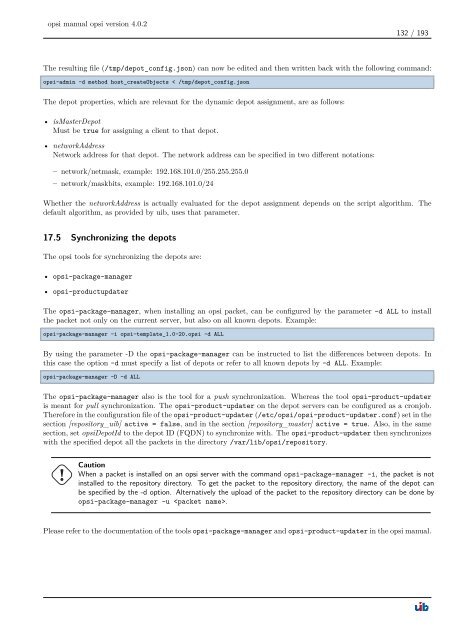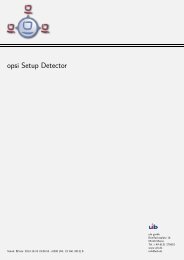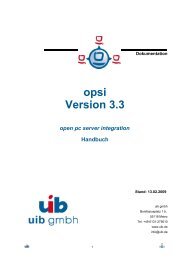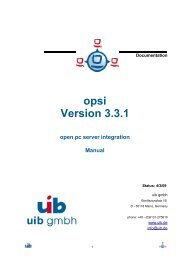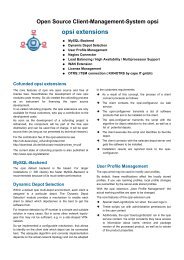opsi manual opsi version 4.0.2 - opsi Download - uib
opsi manual opsi version 4.0.2 - opsi Download - uib
opsi manual opsi version 4.0.2 - opsi Download - uib
You also want an ePaper? Increase the reach of your titles
YUMPU automatically turns print PDFs into web optimized ePapers that Google loves.
<strong>opsi</strong> <strong>manual</strong> <strong>opsi</strong> <strong>version</strong> <strong>4.0.2</strong><br />
132 / 193<br />
The resulting file (/tmp/depot_config.json) can now be edited and then written back with the following command:<br />
<strong>opsi</strong>-admin -d method host_createObjects < /tmp/depot_config.json<br />
The depot properties, which are relevant for the dynamic depot assignment, are as follows:<br />
• isMasterDepot<br />
Must be true for assigning a client to that depot.<br />
• networkAddress<br />
Network address for that depot. The network address can be specified in two different notations:<br />
– network/netmask, example: 192.168.101.0/255.255.255.0<br />
– network/maskbits, example: 192.168.101.0/24<br />
Whether the networkAddress is actually evaluated for the depot assignment depends on the script algorithm. The<br />
default algorithm, as provided by <strong>uib</strong>, uses that parameter.<br />
17.5 Synchronizing the depots<br />
The <strong>opsi</strong> tools for synchronizing the depots are:<br />
• <strong>opsi</strong>-package-manager<br />
• <strong>opsi</strong>-productupdater<br />
The <strong>opsi</strong>-package-manager, when installing an <strong>opsi</strong> packet, can be configured by the parameter -d ALL to install<br />
the packet not only on the current server, but also on all known depots. Example:<br />
<strong>opsi</strong>-package-manager -i <strong>opsi</strong>-template_1.0-20.<strong>opsi</strong> -d ALL<br />
By using the parameter -D the <strong>opsi</strong>-package-manager can be instructed to list the differences between depots. In<br />
this case the option -d must specify a list of depots or refer to all known depots by -d ALL. Example:<br />
<strong>opsi</strong>-package-manager -D -d ALL<br />
The <strong>opsi</strong>-package-manager also is the tool for a push synchronization. Whereas the tool <strong>opsi</strong>-product-updater<br />
is meant for pull synchronization. The <strong>opsi</strong>-product-updater on the depot servers can be configured as a cronjob.<br />
Therefore in the configuration file of the <strong>opsi</strong>-product-updater (/etc/<strong>opsi</strong>/<strong>opsi</strong>-product-updater.conf) set in the<br />
section [repository_<strong>uib</strong>] active = false, and in the section [repository_master] active = true. Also, in the same<br />
section, set <strong>opsi</strong>DepotId to the depot ID (FQDN) to synchronize with. The <strong>opsi</strong>-product-updater then synchronizes<br />
with the specified depot all the packets in the directory /var/lib/<strong>opsi</strong>/repository.<br />
Caution<br />
When a packet is installed on an <strong>opsi</strong> server with the command <strong>opsi</strong>-package-manager -i, the packet is not<br />
installed to the repository directory. To get the packet to the repository directory, the name of the depot can<br />
be specified by the -d option. Alternatively the upload of the packet to the repository directory can be done by<br />
<strong>opsi</strong>-package-manager -u .<br />
Please refer to the documentation of the tools <strong>opsi</strong>-package-manager and <strong>opsi</strong>-product-updater in the <strong>opsi</strong> <strong>manual</strong>.


